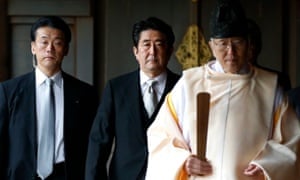Japan’s prime minister, Shinzo Abe, has hinted that he will not repeat previous official apologies for Japan’s wartime conduct in a highly anticipated statement to mark the anniversary of the end of the Pacific war later this year.
Abe’s comments, which are expected to anger former victims of Japanese aggression, came hours before he made a symbolic offering to the Yasukuni shrine, where 2.4 million Japanese war-dead, including class A war criminals, are honoured.
But the conservative leader, who sparked anger in China and South Korea by making a pilgrimage to Yasukuni in December 2013, stopped short of visiting in person during the shrine’s spring festival this week.
By making only a ritual offering, he will be hoping to avoid international criticism ahead of visits to Indonesia and the US.
Speculation has been mounting that Abe’s war anniversary statement will not include an explicit apology and will omit references to Japanese “colonial rule and aggression” on the Asian mainland in the first half of the 20th century.
Both moves would mark a departure from similar statements made by his predecessors to mark the 50th and 60th anniversaries of Japan’s defeat in August 1945.
In a TV interview on Monday night, Abe suggested he would not issue a direct apology to Japan’s former victims. “I uphold the basic thinking behind past war apologies, which means there isn’t a need to reiterate them,” he told Fuji TV.
By ditching an apology and offering a diluted version of Japan’s wartime conduct, Abe would risk inflaming opinion in China and South Korea, just as he attempts to arrange formal summits with their leaders.

He is expected to offer clues to his stance on wartime history at the Asia-Africa conference in Jakarta on Wednesday, in remarks could determine whether he meets Chinese leader Xi Jinping on the sidelines of the summit.
The two leaders held a mini-summit last November – their first formal talks since 2012 - on the sidelines of the Apec meeting in Beijing last November, but Abe has yet to hold official bilateral talks with his South Korean counterpart, Park Geun-hye.
Later this month, Abe will travel to the US, where he will become the first Japanese prime minister to address a joint meeting of Congress.
“The success of the visit … depends on whether and how honestly Mr Abe confronts Japan’s wartime history, including its decision to wage war, its brutal occupation of China and Korea, its atrocities and its enslavement of thousands of women forced to work as sex slaves or ‘comfort women’ in wartime brothels,” the New York Times said in an editorial on Monday.
Beijing and Seoul have insisted that Abe honour a 1995 statement, issued by the then socialist prime minister, Tomiichi Murayama, apologising for Japan’s actions.
At the time, Murayama said that Japan, “through its colonial rule and aggression, caused tremendous damage and suffering to the people of many countries, particularly to those of Asian nations.” Junichiro Koizumi used similar words as prime minister 10 years later.
Although there have been signs of a diplomatic thaw between Japan and China in recent weeks, Abe’s remarks are likely to confirm suspicions that he is seeking to play down the ugliest episodes in Japan’s wartime history.
He has described the tendency for Japanese to ruminate over their country’s atrocities as a form of “masochism”.
He has cast doubt on the widespread belief that Japan coerced tens of thousands of mainly Asian women to work as sex slaves in wartime brothels, and questioned whether Japan’s occupation of the Korean peninsula and part of China could be described as an “invasion”.
Among Abe’s critics at home are the celebrated writer Haruki Murakami, who recently called on him to repeatedly apologise to China and South Korea until the apology is accepted.
“The issue of historical understanding carries great significance, and I believe it is important that Japan makes straightforward apologies,” Murakami said in an interview with Kyodo News.
“I think that is all Japan can do … apologise until the countries say: ‘We don’t necessarily get over it completely, but you have apologised enough. Alright, let’s leave it now.’”




